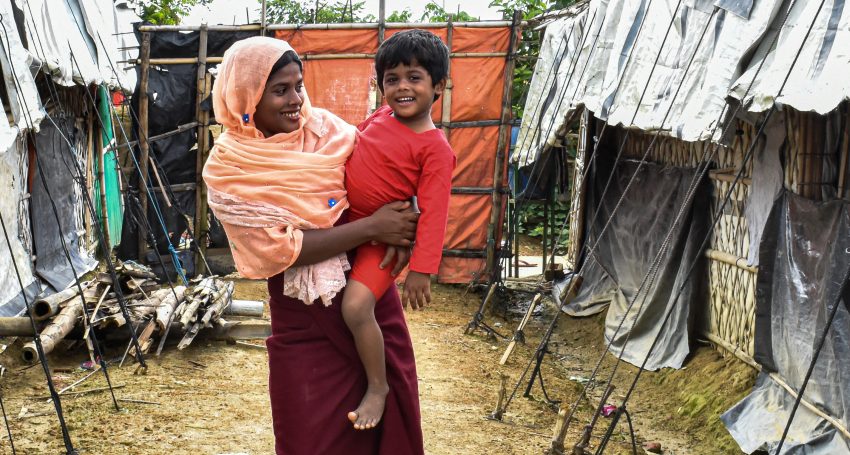Jamila’s positive outlook thanks to Caritas
People
The annual Project Compassion Lenten Appeal is now underway in parishes and schools throughout the Adelaide Archdiocese, with funds raised helping to support people in need such as single mother Jamila, who lives in the world’s largest refugee camp in Cox’s Bazar in Bangladesh.

A Rohingya woman, Jamila, 22, fled the armed conflict in Myanmar’s Rakhine State to save herself, her elderly mother, and eight-month-old baby daughter.
Having been abandoned by her husband, she faced life in the camp, caring for them on her own. Thanks to the generosity of Caritas Australia’s supporters and through its partnership with Caritas Bangladesh, Jamila had access to emergency food and shelter. Then, as her stay in the refugee camp stretched on, with no end in sight, she received lifesaving practical and emotional support through vocational training and trauma counselling.
Advertisement
Jamila had married at 18, a marriage arranged by her parents and is a local custom. Her husband abandoned her for another woman when she was just three months pregnant. Not long afterwards, Jamila was forced to flee Myanmar. She and her family arrived in the refugee camp with almost nothing.
“I cannot explain the mental agony of leaving my own country,” Jamila says. “All I thought was that I needed to escape. People were trembling in fear, then we had to walk for five or six days.
“It seemed a totally awful place for me. I was completely overwhelmed. In the early days, it was a bare area, with no life-supporting needs like food, shelter and water.”
There were also unexpected dangers, with fears that roaming elephants would trample their makeshift shelters.
Hundreds of thousands of Rohingya people have crossed the border into Bangladesh since August 2017 after fleeing deadly violence in Myanmar’s Rakhine State. More than 1.3 million people remain in the densely populated camps in desperate need of humanitarian assistance.
Cox’s Bazar is already one of the most vulnerable districts in Bangladesh due to its increased exposure to natural disasters, poverty, poor education and limited livelihoods. Even before the refugee crisis, 33 per cent of residents lived below the national poverty line, with 17 per cent below the extreme poverty line.
When Jamila arrived at the refugee camp, she was assisted with immediate emergency food and shelter. However, as a woman alone without any livelihood skills, Jamila was facing an uncertain future. Then Jamila joined the camp’s Women Friendly Spaces project, which is run by Caritas Bangladesh.
In this safe, joyful and motivating environment, Jamila finally felt a sense of belonging. She received counselling and emotional support, learned about health and hygiene, and took part in a parenting program. She also signed up for sewing training as part of a skills-building workshop to help refugee women to earn an income.
“For the first time in my life, in the camp, I felt cared for and accepted,” Jamila says. “The facilitators took care of my daughter, so I could attend classes or take a nap if I needed it. My worries of an uncertain future are disappearing. It was like a ray of hope that spreads in the dark night, through the light of the Women Friendly Spaces.”
Advertisement
As part of this program, Caritas Bangladesh has also trained a group of counsellors from the Rohingya community to reach out to other women. They go door-to-door and visit women in their shelters. They talk to women and help them face the challenges of living in a camp, including how to manage their hygiene needs and maintain social distancing during the pandemic.
Jamila has now built a sense of family and community around her mother and little girl, and she feels less alone and unsupported.
“I know more people than before, I can depend on them,” she says. “I can see many women like me who are benefitting from this program. They are coping on their own, able to decide independently, gaining stability mentally and ultimately being able to resume a normal life, like me.”
Through the generosity of Caritas Australia’s supporters, about 280,000 people have benefitted from this program so far.
Just as things were looking up in the camp, COVID-19 hit. Without proper sanitation, and with water, soap and masks in short supply, it posed a serious threat.
On the ground, Caritas Australia’s partners, Caritas Bangladesh and Catholic Relief Services (CRS – Caritas USA), were able to act quickly to minimise the spread of the deadly virus by sharing prevention messages, conducting training sessions, installing hand-washing stations, repairing toilets, and distributing soap and masks.
In spite of their challenges, Jamila, her daughter and her elderly mother remain strong. In the future, when she can afford to buy fabric, Jamila hopes to make a living by sewing and selling her products at the market.
“Jamila will be able to create a living through her learning from this program,” says Ankhi Akter, program manager for the Women Friendly Spaces Project.
“She and her daughter have been able to overcome distress, now gaining stability. She is developing resilience to cope on her own and is able to make decisions independently, with confidence.
“Thanks to our generous supporters, Jamila and her family of three now have a future where positive choices are accessible,” Mr Akter says.











Comments
Show comments Hide comments